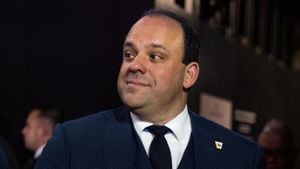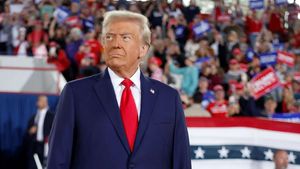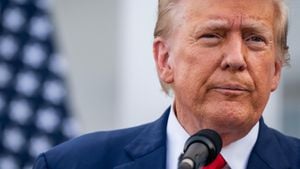European Defense Ministers from five key nations met recently to discuss the pressing need for increased military investment, particularly amid rising tensions related to the Ukraine conflict. With the backdrop of fears surrounding the potential return of Donald Trump to the political arena and its possible ramifications on U.S. foreign policy, the ministers from France, Germany, Italy, Poland, and the United Kingdom came together to advocate for heightened defense expenditures.
Germany’s Defense Minister, Boris Pistorius, emphasized the necessity of not merely increasing financial allocations but rather addressing existing capability gaps. "Regardless of the [defense] budget rise to 2, 2.5 or 3 percent, we need to close the capabilities gaps, this is the most important thing,” he remarked following the discussions held in Berlin. This sentiment reflected the ministers' shared acknowledgment of the roles each nation must play to fulfill NATO’s capability requirements, which will require bolstering military spending overall.
The conference underscored the need for effective utilization of defense budgets, rather than sidelining the matter with mere funding increases. France’s Armed Forces Minister, Sébastien Lecornu, echoed this sentiment by posing the question of how Europe could optimize military capabilities with the funds at their disposal. He spotlighted collaborative initiatives, such as the European Long-range Strike Approach (ELSA), aimed at developing advanced military technology like cruise missiles, as pivotal steps toward closing existing capability gaps.
Interestingly, France and Germany have recently met NATO’s spending target of at least 2 percent of their GDP, with the UK surpassing this threshold as well. Poland has emerged as the biggest spender within NATO, allocating around 4.1 percent of its GDP to defense. Discussions about potentially raising the current 2 percent target to 3 percent have gained momentum, especially considering the military’s shifting dynamics and pressures stemming from the long-lasting conflict with Russia.
Stepping back to the broader European response to the Ukraine conflict, ministers collectively stated their unwavering intention to continue providing military assistance to Ukraine. Britain's Defense Secretary John Healy even went so far as to advocate for "doubling" the support offered, illustrating the strategic importance of maintaining strong defense ties amid uncertainties about future U.S. support. The continued flow of military aid to Ukraine looms large, particularly as the nation contends with the fallout from Russia’s aggressive tactics.
Simultaneously, reports indicate Germany is also spearheading efforts to examine its own emergency preparedness, devising plans including compiling lists of potential bunkers for civilian shelter. This proactive stance mirrors the heightened emphasis on national defense, reflecting European nations' growing awareness of their vulnerability amid tensions with Russia.
With the war’s unpredictability and the potential political shifts within the U.S., the unity among these European nations is increasingly pronounced. Recently, NATO officials noted changes within the Russian military; even though the size has expanded since launching full-scale hostilities against Ukraine, there are concluded assessments about the declining quality of its forces. This factor is seen as presenting European nations with opportunities to solidify their positions and strengthen their defenses.
Arsalan Bilal, from the Center for Peace Studies at UiT The Arctic University of Norway, recently articulated the damages inflicted by Russia’s hybrid warfare tactics against the UK. He delineated the "very real" and long-lasting consequences of Russian military strategies, pointing to incidents such as the severing of telecommunication cables and other subversive attacks as modern warfare’s manifestation. Bilal articulated significant concerns about hybrid warfare's insidious impact; he states “It is a war aimed to undermine Western security,” encapsulating the essence of the struggle European nations face as they recalibrate their defense strategies.
The backdrop of multiplied security dialogues and strategic discussions with NATO partners, including Turkey, encapsulates the urgency displaced by the war’s continuation. During recent discussions, Turkish President Recep Tayyip Erdogan reiterated Turkey's longstanding role as peacemaker, emphasizing the nation's desire to negotiate paths toward deescalation. While Turkey's suggestions have yet to gather wide acceptance, the involvement of such regional players adds layers to the complex diplomatic chess game surrounding the Ukraine conflict.
Germany's focus on dual strategy—ramping up military support to Ukraine and strengthening its own civil preparedness—is illustrative of the broader response being crafted across European nations. Collectively, the actions undertaken by governments poised between emissions of past conflicts and the need for future readiness highlights the enduring concern surrounding potential fallout and threats.
The convergence of calls for military readiness reinforces defense dialogues across Europe, with senior military leaders asserting the grave necessity of sustained, coordinated efforts to bolster national capabilities amid heightened uncertainty. With each subsequent meeting and discussion, the European commitment to standing united against external threats grows increasingly evident.
Against the backdrop of the Ukraine conflict and uncertainty clouding U.S. policy, European ministers’ calls for enhanced defense investment not only respond to immediate concerns but also hint at broader strategies for self-sufficiency and regional stability. To surmise, as the geopolitical climate continues to shift and morph, the collective posture adopted by European nations signals their readiness to adapt, grow stronger, and uplift their military aspirations.



